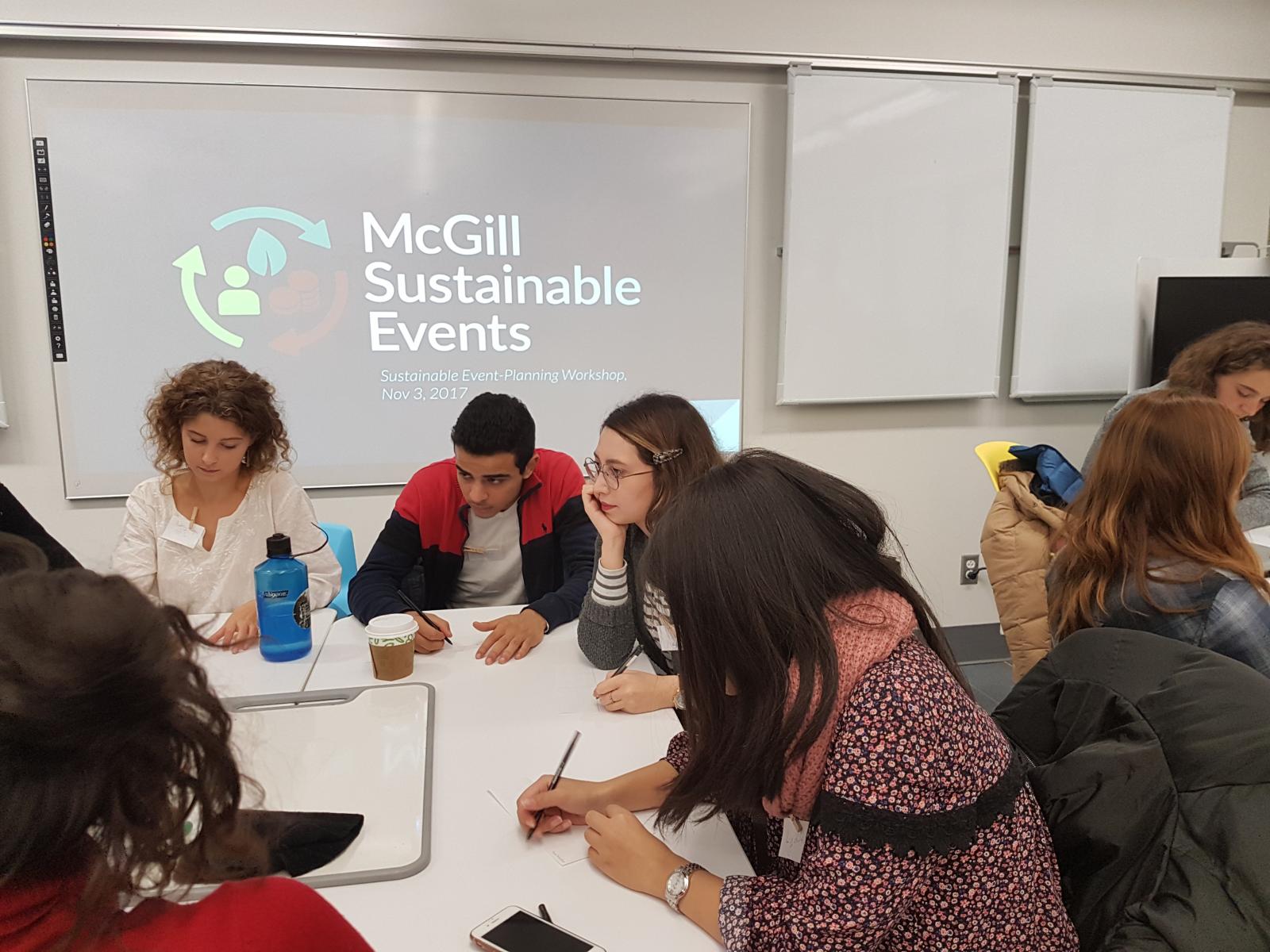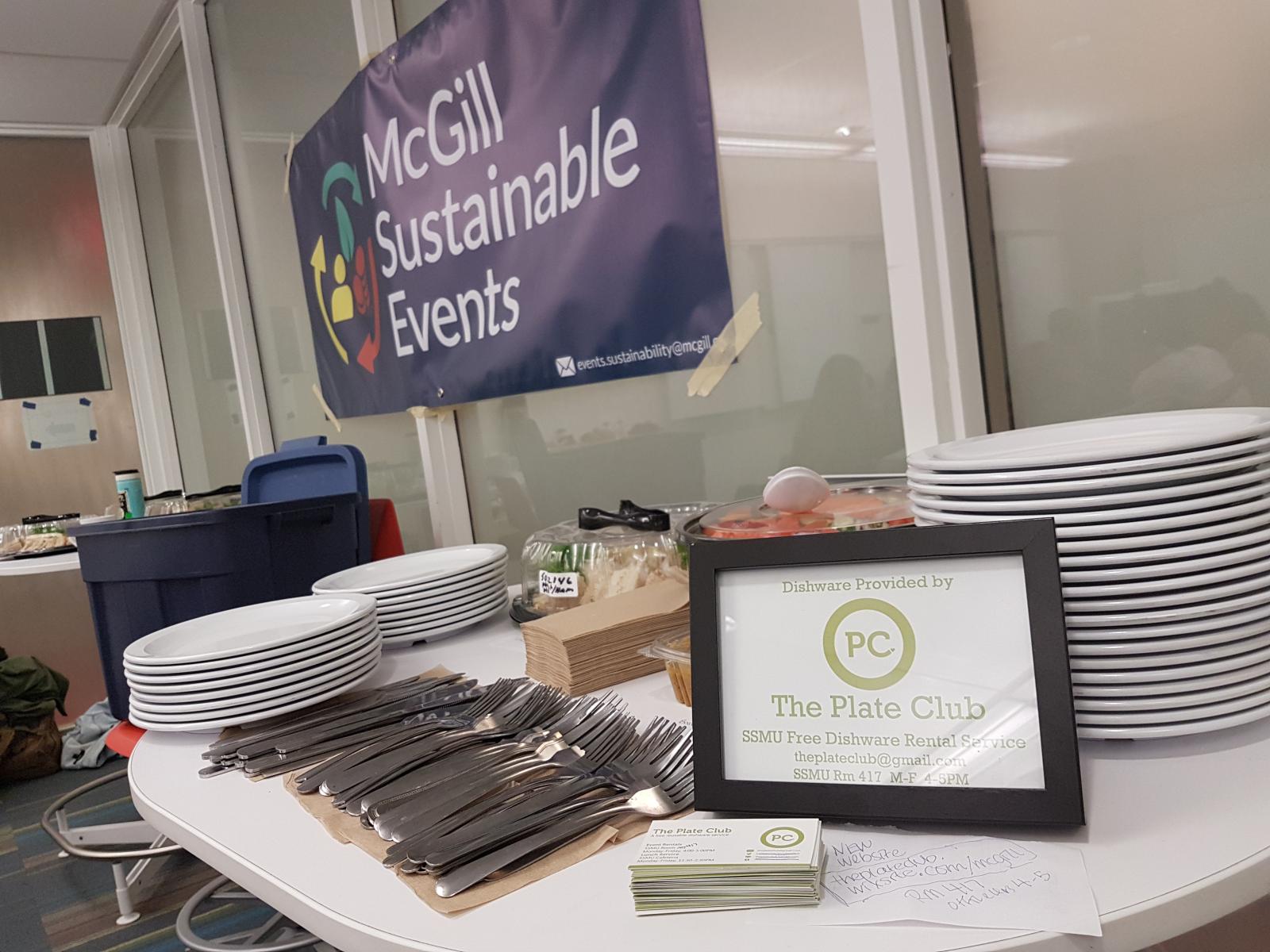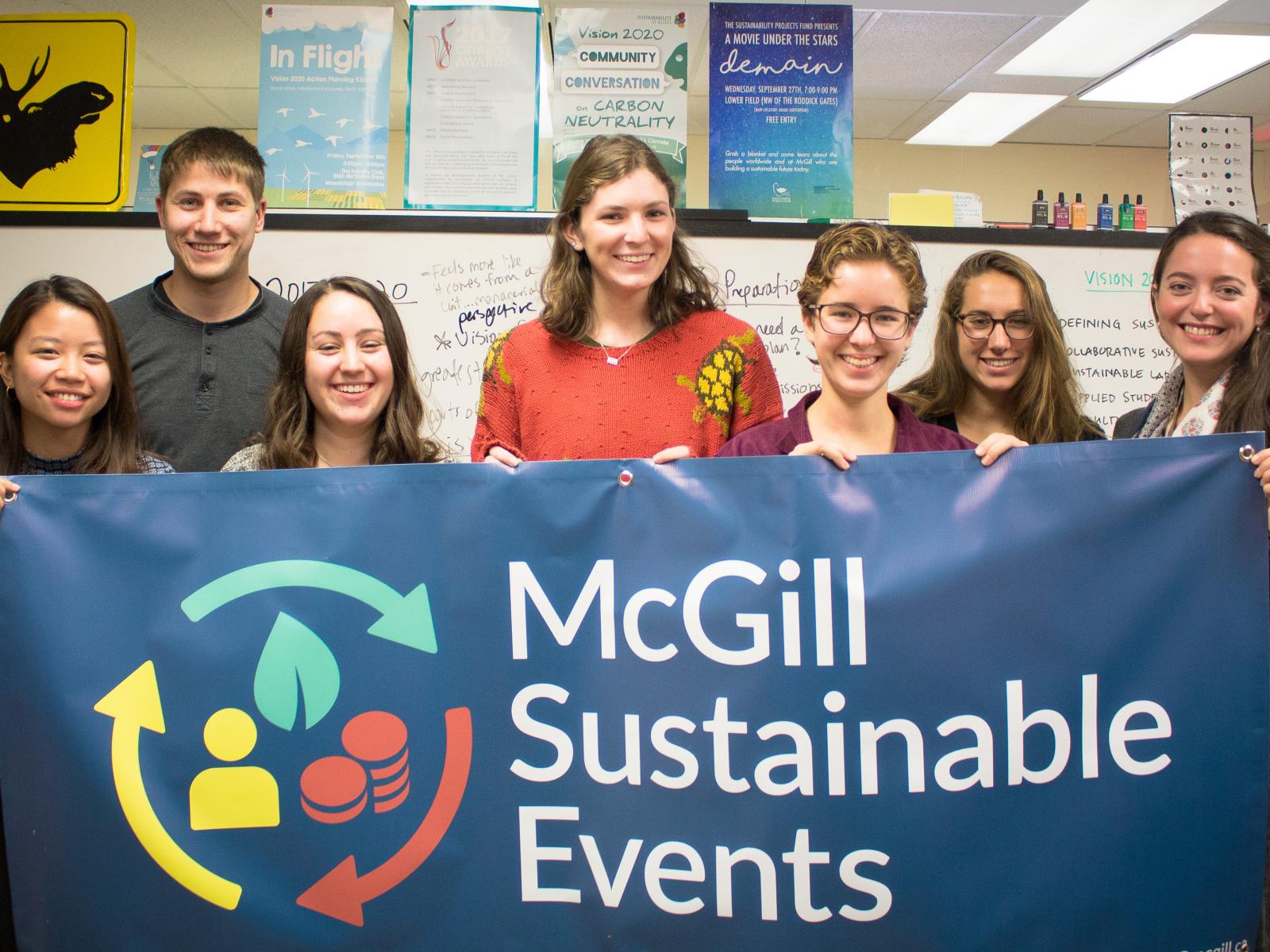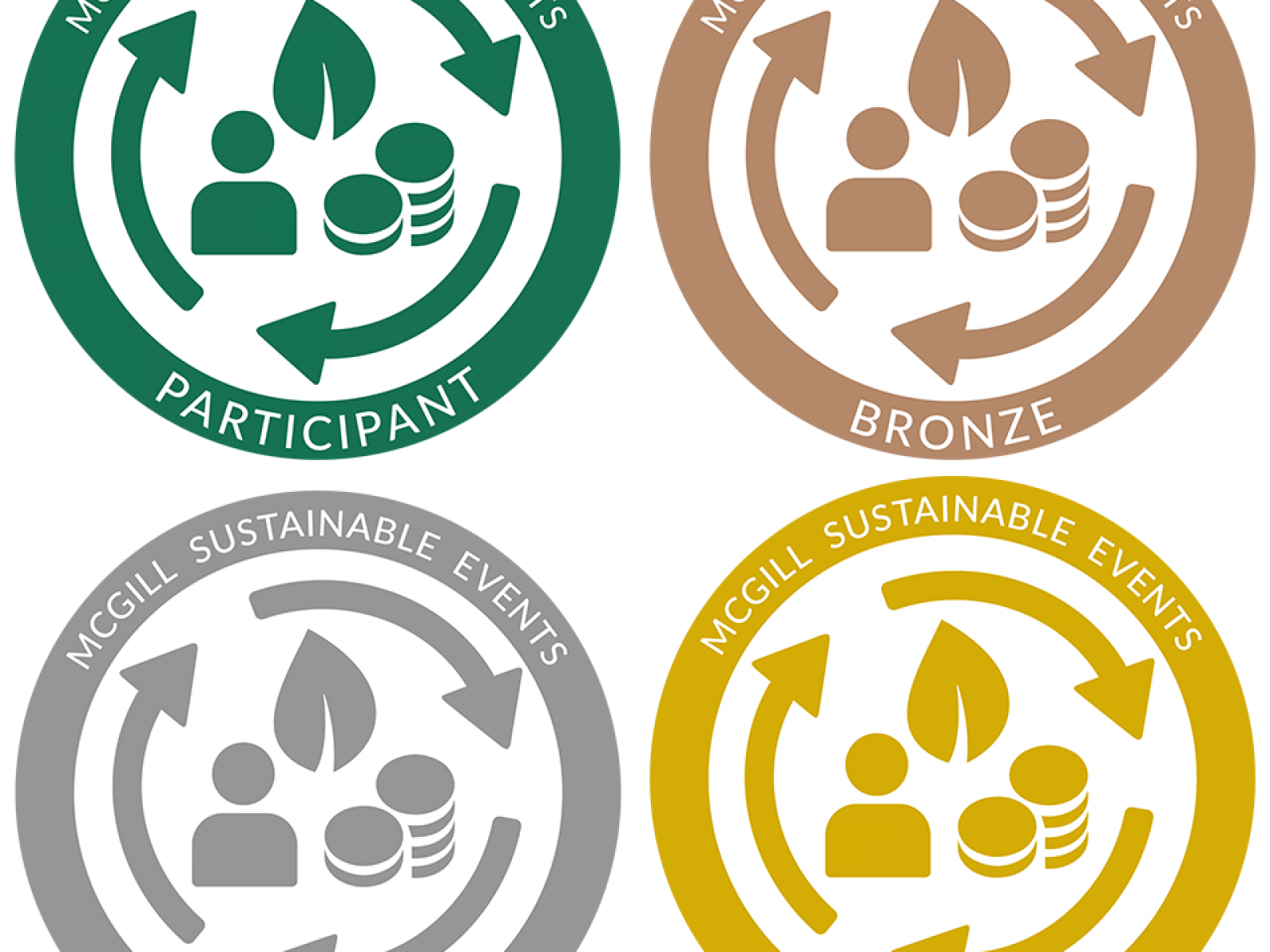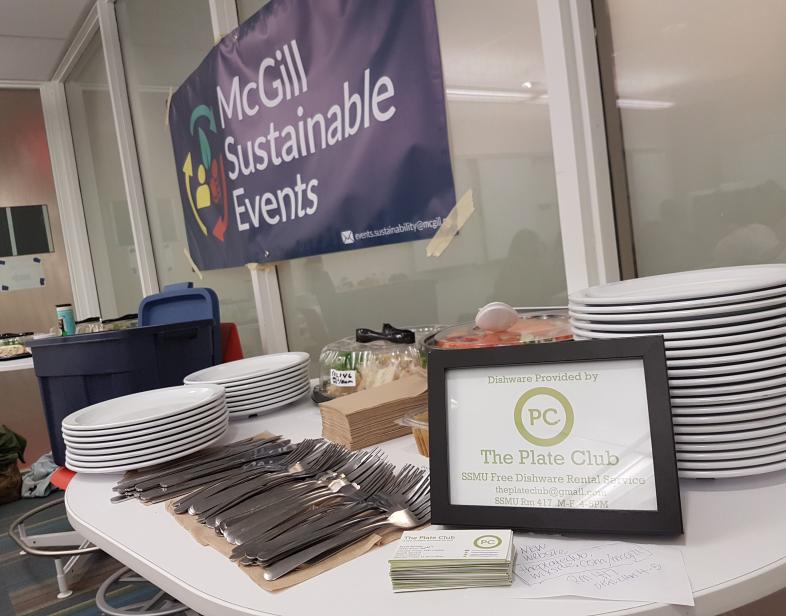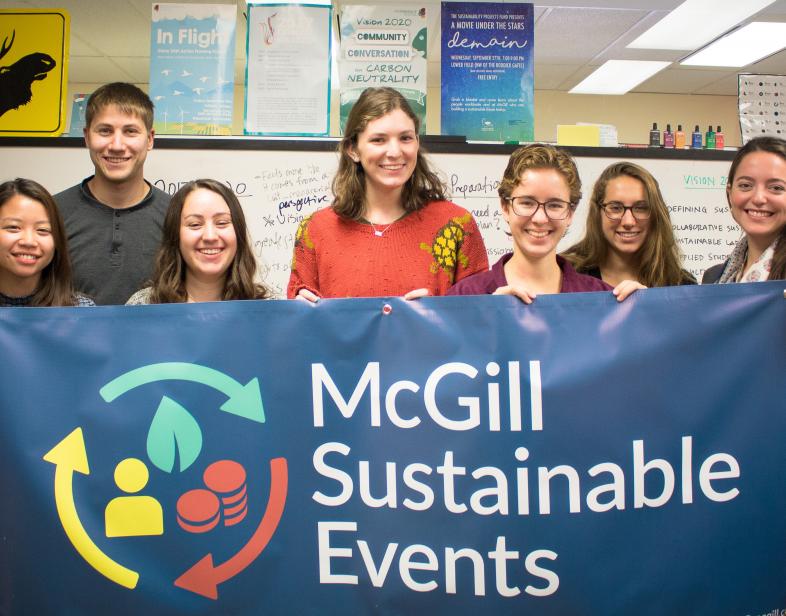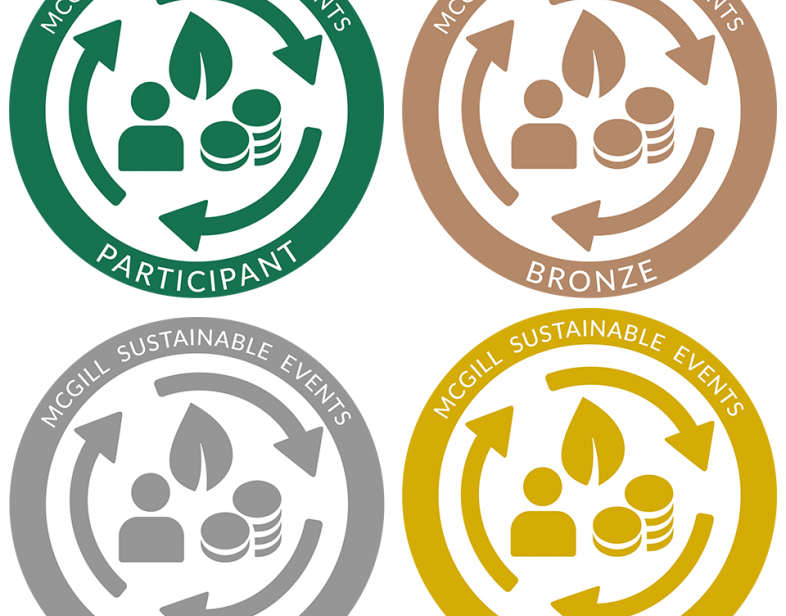An Overview Of Our Solution
The McGill Sustainable Events Certification Program was launched in September 2017 as a collaboration between staff and students. Each year, thousands of events are hosted at McGill and result in considerable environmental costs. Social sustainability norms are often created at events (e.g. language, preferred pronouns, traditional land acknowledgment). Our program is a positive, voluntary recognition framework which educates & guides event planners to choose more environmentally, socially, and economically sustainable options.
In just 1 year, over 50 events have gone through the event certification process, with a total of nearly 20,000 individuals attending a McGill Sustainable Event. This program's success has hinged on its reliance on student leadership, website, & targeted outreach. Positive change has radiated from event planners throughout campus.
- Population Impacted: 50,000 over 2 years
- Continent: North America
Context Analysis
McGill University is among the top universities in the world, and hosts over 45,000 students, professors and administrative staff, spread across nearly a hundred buildings in 3 campuses. Such a large population requires physical infrastructure (power, water, waste management) and social infrastructure to promote mental health and cohesion for students and employees.
McGill hosts thousands of events per year for the McGill community and external clients. Events range from graduation ceremonies with hundreds of students and parents, donor banquets, case competitions, and team meetings. Events are a key aspect of life at the university: in a student's first few days they attend a week long orientation which sets the culture and social cohesion for their time in school, and clubs spend most of their time organizing social and informational events. However, this large scope leads to a huge environmental impact: events are major sources of ghgs, single use plastics, food waste, etc.
Describe the technical solution you wanted the target audience to adopt
The McGill Sustainable Events program has a two-part certification program:
1. www.McGillSustainableEvents.ca – online toolkit. This interactive platform walks event planners through a sustainable event checklist consisting of 40 concrete actions and resources. This project has evolved from a static pdf checklist to a nice looking platform.
2. Certification: Once the event planner has submitted their event information on the website, a trained volunteer student event
consultant is automatically notified and matched with the event planner. The event consultant meets with the planner to explain each action, provide additional resources, answer any questions, calculate the score, and provide follow-up. The event can receive one of 4 increasing levels of certification: Participant, Bronze, Silver, and Gold. They are provided a seal of certification and a template to communicate their commitments to the event participants, and their success is publicized on the program’s website.
Type of intervention
Describe your behavioral intervention
The program has been successful by removing common barriers that event planners face. Several components are greater than the sum of their parts:
- Raise awareness: when event planners peruse the checklist, they learn more about possible changes in a positive manner. For example, most event planners think about the amount of paper printed, but most don’t know about aspects of social sustainability (physical accessibility, equity in planning team, recognition of traditional Indigenous territory) or less known environmental concerns (greenhouse gas emissions associated with flying or meat consumption)
- Provide information and resources: An event planner can learn more about a socially/environmentally responsible problem and easy, concrete solutions with resources. E.g. planners can use our tool to measure ghg emissions from travel, then purchase carbon offsets to receive a point toward certification
- Save planners time and money: the trained student consultants meet up with planners at their convenience and provide them ideas and resources. e.g. where to borrow free reusable dishes
- Provide recognition: certification logos rewards the event planner, and can easily displayed on print and digital media. As brand recognition grows, participants expect higher sustainability standards and can help with accountability. Planners aim for higher and higher levels in the certifications.
- Flexibility: specific enough to require quantifiable action, yet fit a wide event variety
As needed, please explain the type of intervention in more detail
social incentives: provides public recognition to event planners and their events of clear levels of certification, and their efforts are publicly commended on the program's social media
choice architecture: by providing points for each action, a planner will work to get points they see as attainable. providing resources including specific lists of caterers, composting removal services, etc eliminates the guesswork and saves time and money.
Describe your implementation
ACTIVITIES:
Certification:
- in late August, we recruit and train 10 volunteer student event consultants, meetings 1x week
- we promote the Sustainable Event website and certification: targeted outreach to administrators, student activity night, newsletter, social media
- when school starts in early September, we meet with new club executives and event planners to explain the program and offer a brief training
- throughout the year when we hear of large or high-profile events, we reach out to planners to offer our services
- we automate our process as much as possible to keep administrative & material costs low
- send feedback survey to each client, ask for photos
Resources:
- our student team researches new resources and improves the info
- we work with internal & external suppliers to convey our standards and show there is a market for better alternatives.
Policy changes:
- in early 2018 our office announced a McGill wide phase out of the sale and distribution of single use water bottles at events. Although planners face logistical issues, we work with the bottle water ban project to ensure that people understand what the policy means, connect it to the larger sustainability vision on campus, and offer low-cost reusable water bottles.
KEY SUCCESS FACTORS:
- a voluntary checklist is a nonthreatening way for planners to learn more about sustainability.
- student volunteers are very key, since they provide the increased capacity to meet with all of the planners. This is a great learning & leadership opportunity for them, and builds their confidence.
- by including social sustainability (e.g. accessibility, equity), we catch the interest and support of planners who aren't necessary interested in environmental responsibility, but social responsibility. Vice versa: the program educates environmentalists the social sustainability aspects.
- we explain the benefits to planners: increased event participation, recognition, $ saved, etc
External connections
McGill event planners: while developing the materials, we met with event planners to understand their processes, key barriers, and kinds of resources and info would be helpful in various formats.
Checklist actions: we met with various stakeholders during the checklist development to make sure the actions were realistic, measurable, and actually priorities. For example, we met with equity groups, procurement, climate expert, student leaders, etc.
Social equity: although most of the volunteer event consultants study environmental science, they often lack concrete understanding of how to promote equitable and accessible events. We work with other McGill groups (e.g. Black Students Network, Social & Diversity Office) to receive trainings and learn how to discuss these sensitive and complex issues with event planners.
Procurement: We work with external suppliers to show them that there is a demand for more sustainable materials and socially responsible businesses, while following McGill Supplier Code of Conduct. For example, we work with an external composting company to make sure they understand the university's specific needs and invoicing system to reduce administrative barriers.
Who adopted the desired behaviors and to what degree?
The program launched in early September, 2017. As of August 7, 2018, 55 events have completed the event certification program. In that time frame, ~18,780 individuals attended a certified event.
A wide range of undergrad, graduate students, faculty, and staff have adopted the desired behaviors. Actions taken by planners trickle down to participants.
Examples of who adopted the desired behaviors:
- Special Events Coordinator - encouraged other campus event planners to adopt
- Graduate and undergraduate VPs for student societies & clubs
- Convocation (graduation) event planner
- Event planners from various administrative units (University Advancement, Teaching & Learning Services, Continuing Studies)
- Business conference planner
- Residence event planners (Halloween party, student staff training program)
Suppliers have also changed:
- Student Housing and Hospitality Services expanded their waste educator program
- University caterer offers reusable dishes, reduce plastic
How did you impact natural resource use and greenhouse gas emissions?
The checklist consists of 40 actions which directly increase environmental (reduce ghg, waste, energy) or social sustainability (improve physical and social accessibility, diversity, equity).
Actions which concretely reduce ghg emissions:
- provide vegetarian/vegan food and beverage options
- Purchase carbon offsets/onsets
- Reduce flying: use teleconferencing instead
- Location close to public transportation
- Increase availability of recycling and compost bins, proper signage, and volunteer educators
- Have event in LEED certified building
- Make provisions for surplus food
Waste:
- reduce single use plastics, swag, disposable name tags etc
- reduce paper printing
Water:
- no bottled water
What were some of the resulting co-benefits?
Co-benefits:
- expanding participant and planner understanding of 3 dimensions of sustainability
- culture change: announcing traditional Mohawk territory, link to colonialism
- particularly for McGill staff: increasing awareness of universal design, increasing physical and social accessibility, sharing preferred gender pronouns
- food: increasing campus market demand for local and vegetarian/vegan menu items
- promote sustainable economics: fair trade coffee, sliding scale payments, locally based suppliers, using social economy suppliers
- learning and leadership opportunity for students
Sustainability
The online toolkit + initial part time coordination received a McGill Sustainability Projects Funding of $8,000.
We are a university, so the funding comes from the university's operating budget. The program is supervised by a Sustainability Officer who works for the university, who also coordinates the other engagement programs (sustainable office certification, leadership training, staff gardens etc).
There is no cost to event planners to receive the certificate.
Return on investment
Initial grant funding for online toolkit + setting up program: $10,000
professional Sustainability Officer supervisor: 5 hrs per week @ $28.00/hr
12 volunteer students who receive co-curricular record recognition: free
Website domain name and small marketing materials: $30/year
The cost-benefit is very favorable, considering the start-up cost of $10,000 and yearly operational cost of about $1,500.
How could we successfully replicate this solution elsewhere?
Other universities and cities have developed aspects of the certifications, but ours is different:
Accountability: some justification is required to receive an action's point (e.g. write out how you think you have considered equity in event programming). Score is adjusted based on what the planner commits to. Our staff can "spot check" the event and a penalty system is in place if any events are untruthful about their score. Other programs either have very rigorous accountability (e.g. Quebec's provincial certification which takes hours to complete) or none at all.
Nuances: actions can offer partial credit (e.g. planner calculates transportation GHGs but doesn't offset them). Actions consider 3 dimensions of sustainability,
REPLICATION
This program's structure is very scalable for other universities, cities, and companies.
~$100,000 to create international program: full time coordinator (25K), marketing (25K), platform (25K), auditors & training(25K)
